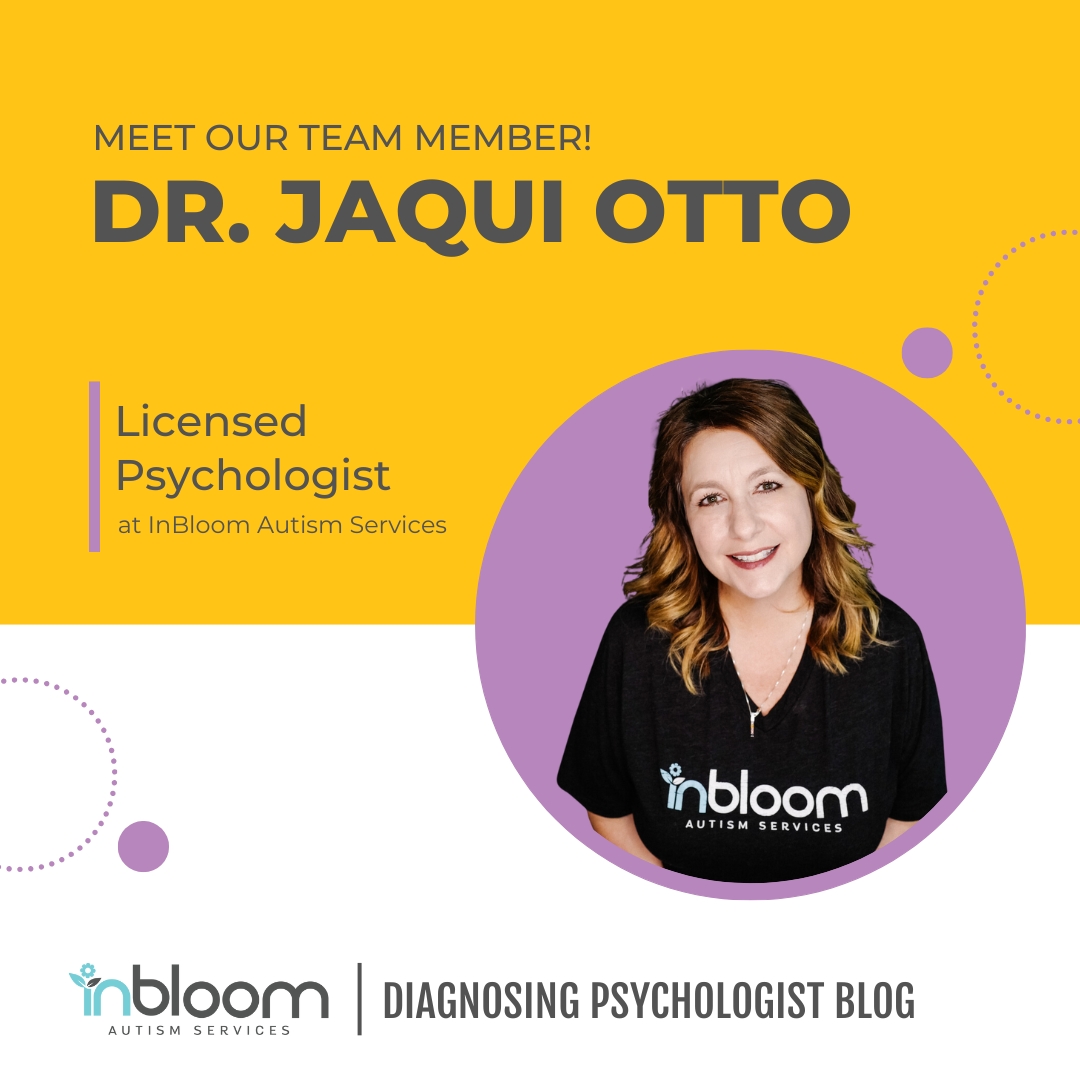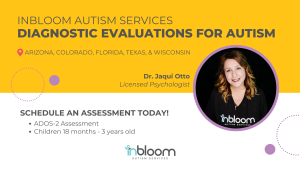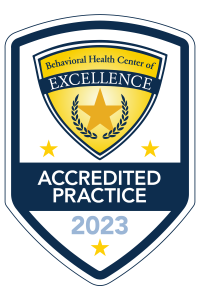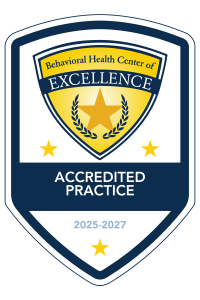Meet Our Licensed Psychologist, Dr. Jacqui Otto

Get ready to meet the newest addition to our InBloom family – Dr. Jaqui Otto! With nearly two decades of experience in evaluating children and young adults, Dr. Otto joins our team with a wealth of knowledge. We consider ourselves truly fortunate to have her expertise at the ready for the families we serve. As our new in-house Licensed Psychologist, Dr. Otto will be providing autism diagnostic services for children 18 months to 3 years old at our Learning Centers in Arizona, Colorado, Florida, Texas, and Wisconsin. To help you get better acquainted with Dr. Otto, we asked her a few questions!
1. First off, please introduce yourself.
I’m Jaqui Otto and I’m a Licensed Psychologist. I did my undergraduate work at Texas A&M and my graduate work, both Masters and Ph.D. at the University of Utah in Salt Lake City.
2. What are 3 fun facts about you?
Fun facts, let’s see. I have recently taken up crocheting, which is something I’ve never done before. It’s kind of fun, keeps my hands busy, and slows me down so that I’m not constantly thinking. And I have 3 sons, and other fun facts… I once took a yoga class from Woody Harrelson. That’s probably the weirdest thing that’s ever happened to me.
3. What is your experience and background in diagnosing autism spectrum disorder (ASD)?
I have been assessing children with autism for many years. I started my career as a school psychologist where we did team assessments in school districts for children ages 3 to 22 years old. So I did a lot of team-based assessments for young children. I then moved into private practice. Over the last 7 years, I’ve been doing private practice evaluations, for autism spectrum disorder as well as a whole host of other psychological, and developmental challenges and concerns that families have. So this is kind of the next step in providing those types of evaluations for children.
4. What drew you to InBloom?
A couple of things, one was certainly the ability to provide assessments to families free of charge was an enormous draw. It’s clearly very challenging for parents and caregivers to get an initial diagnosis. And while I as a Licensed Psychologist respect the fact that insurance companies rely on our expertise for this diagnosis. I also recognize that it places a burden on families. In different parts of the country, it’s difficult to find evaluators who are both qualified and can provide this service without it being an enormous expense to the family. So that’s really one of the exciting things for me. I think it’s really a valuable service that I will be able to provide. And I love the idea that families will be able to get that evaluation taken care of so that they can move on to what’s really important, which is treatment.
5. Can you explain the assessment process and what families can expect during their child’s evaluation?
An assessment process has a couple of different components or steps. The first is, gathering background data. Understanding what the parents are seeing from the child or what a physician or other provider has seen that is causing them to have a concern about autism spectrum disorder. Background information comes from information that parents fill out as well as a direct interview that I conduct with parents. I ask them lots of questions about their child’s developmental history, what behaviors they observe, and what concerns they have.
In addition to that, we may ask parents to fill out a standardized behavior checklist where they are answering questions. Indicating whether they see a particular behavior or whether a particular behavior is missing from their child’s development at this point.
And then the third component is a direct evaluation with the child. We use a play-based assessment, most often we use an assessment tool called the ADOS-2. Insurance companies generally consider the ADOS-2 to be the gold standard tool for assessing autism, especially in young children. The direct assessment usually lasts anywhere between 45 minutes to 1.5 hours, depending on the child.
The last component of the assessment process is to observe the child in an environment where I’m not making a lot of demands on them. Where they can play with toys or interact with their parents or choose to interact with me if they want to. I like to get a sense of what their naturalistic behavior looks like when they’re engaged with high-interest toys. So, interview, behavior checklist, direct assessment, and observation.
Watch Video Here: https://youtu.be/of1idRs-Vz8
Is your child between the ages of 18 months and 3 years old?
Click here to schedule autism diagnostic services with Dr. Otto.
6. How do you ensure a child-centered approach during the diagnostic process?
I would say a couple of things. The first is that the assessment tools we use are created with young children in mind. They utilize extremely fun toys, colorful objects, and things that children would generally and naturally be drawn to. In addition, my setup is on the floor for the majority of my assessment, so we’re in the natural play environment of a young child. We’re not asking them to sit at a table but we can do that if it works better for the child. The other piece of that child-centered puzzle for young children is that parents are always there. I’m not looking to take a child into an evaluation setting without their parent. In fact, I get much better information when parents are present given the age of the children.
7. What advice would you give a parent or caregiver noticing some possible signs of autism in their child?
I would recommend that they utilize respected websites and their providers, their Physicians, and their pediatrician to ask questions and gather information. Pediatricians are skilled at providing a screener that helps parents understand if what they’re seeing from their child may be indicative of autism spectrum disorder. Some helpful websites include: Autism Speaks, National Institute of Mental Health, Autism Society, Organization for Autism Research, and CDC Autism Information Center.
8. Why is it important to have a licensed psychologist assess a child for autism?
Autism assessment especially in young children can be very challenging. Making a differential diagnosis between a couple of different things that might be going on developmentally is difficult. And licensed psychologists are particularly well-trained and well-versed to help make those diagnoses. And help parents understand if what they are seeing in their child is consistent with autism spectrum disorder (ASD). Being assessed by a psychologist as soon as autism is suspected is important because it is critical that children with autism receive early intervention. That’s also one of the reasons why InBloom is so interesting to me. It allows me to ease that path into getting children services quickly so that they can be prepared to be in the least restrictive environment where they can be successful educationally and socially as soon as possible.
9. What can parents and caregivers expect from a diagnostic assessment? And how can they prepare?
I think that the parents can really expect is that I’m going to do everything I can to help their child feel comfortable. It is a new environment and what we clearly know about children with autism spectrum disorder (ASD) is things that are new and different are not always welcome. So to interact with a stranger or be in a strange environment can be challenging. It’s helpful if parents stay calm and help soothe their child in whatever way that child finds calming. It is important that parents know that they are going to be with their child 100% of the way. I’m never going to look to separate their child from them throughout this process.
Throughout the assessment, I’ll be looking to understand how their child communicates, interacts, and experiences the assessment environment. Parents will mostly observe the process but I will always ask for their input, suggestions, and observations while I play with their child. Parents may observe that their child doesn’t interact with me the same way they do at home. That’s OK. I’ll be asking lots of questions to understand if what I’m seeing is similar to what parents see in more familiar settings. I will also ask parents to try to do some things with their child so I can see if their child’s response to a familiar adult is different than his/her response to me.
I would also encourage parents to ask questions. Ask, ask, ask! If they have any questions about something that they see me doing to play with their child and they don’t understand what I’m trying to do, what I’m trying to elicit, what I’m trying to gain or see about their child. I invite them to ask questions and make sure they understand what’s happening.
10. Finally, what would you tell a family that recently received an autism diagnosis and is overwhelmed or nervous about their child’s future?
I would say that a diagnosis of autism is a challenge that invites us to take a different perspective when looking at a child. It is not something that has to end our dreams for our children. It just asks us to make sure we’re doing everything we can to help that child accomplish those dreams. We may have to shift our dreams a little and that can be very challenging and scary. The most important thing parents can do is LEARN! I would encourage parents to educate themselves by asking lots and lots of questions. Discover what resources are available to them, make connections with other parents of children with autism, and build strong partnerships with educators and providers on behalf of your child! Also, understand that INTERVENTION is key! Good intervention, like ABA therapy, partnered with the time to grow and develop, makes a huge difference for children with autism. What they see in their child today may look very different tomorrow!
Click here to schedule autism diagnostic services for your child or call us at 888-754-0398.




